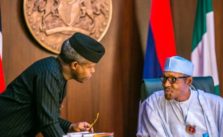President Muhammadu Buhari has further shrunk the workload of his deputy, Vice President Yemi Osinbajo as he announced on Tuesday that the supervision of the National Social Investment Programme, NSIP, hitherto under Osinbajo’s watch has been moved to a new ministry.
The programme, an innovative social programme in which government budgets N500 billion yearly, but never really releases the entire appropriation, had been under the office of the Vice President since it was launched in 2016.
A special adviser in the presidency, Maryam Uwais supervises the programme. The programme utilises information technology to reach and target beneficiaries and has earned plaudits. Last week, Schwab Foundation For Social Entrepreneurship , a sister organization of the World Economic Forum conferred its Public Social Intrapreneur award on Mrs Maryam Uwais.
President Buhari announced today in his 59th Independence Anniversary Speech that it was time to institutionalise it with the creation of the Ministry of Humanitarian Affairs, Disaster Management and Social Development.
At the moment, the NSIP comes in different shades: Home-grown School Feeding Programme, Government Economic Empowerment Programme, N-Power Job Creation Programme, loans for traders and artisans, Conditional Cash Transfers to the poorest families and social housing scheme.
Buhari promised that the programme will continue to target these vulnerable groups, including those who may be impacted ‘painfully ‘ by the economic policy directions that may be suggested by the new Economic Advisory Council.
“To institutionalize these impactful programmes, we created the Ministry for Humanitarian Affairs, Disaster Management and Social Development which shall consolidate and build on our achievements to date.
To the beneficiaries of these programmes, I want to reassure you that our commitment to social inclusion will only increase”, Buhari said in the broadcast.
“However, we are also committed to ensure that the inconvenience associated with any painful policy adjustments, is moderated, such that the poor and the vulnerable, who are most at risk, do not bear the brunt”, he added.
